Are you looking for the best platform to build your online store or website? Read on to discover which platform, WordPress or Shopify better for SEO.
By 2030, e-commerce retail sales are expected to be just shy of $9 trillion.
Shopify is an e-commerce platform that allows you to create your own online store. It hosts your site and provides you with all of the necessary tools.
WordPress, on the other hand, is an open-source platform. You must host your own website and install e-commerce plugins such as WooCommerce.
Both are web-building giants, but they cater to very different needs. We’re here to assist you in determining which is best for you: WordPress or Shopify.
We’ve independently researched and tested a large number of platforms, including these two, and are now in a position to share our findings with you – see how these platforms fared in our research below:
By the end of this guide, you’ll understand the key differences and be able to decide whether Shopify or WordPress is right for you.
Shopify overview
Shopify is an all-in-one eCommerce platform that allows you to start, grow, and manage a business by creating and customizing an online store.
Shopify allows you to sell in a variety of places, including web, mobile, social media, online marketplaces, physical locations, and many more. Simultaneously, you will be granted admin rights to manage products, inventory, payments, and shipping.
Updating/maintaining software or web servers is not required on Shopify because it is completely cloud-based and hosted, allowing you to access and run your business from anywhere with an internet connection.
Shopify Pricing Plans
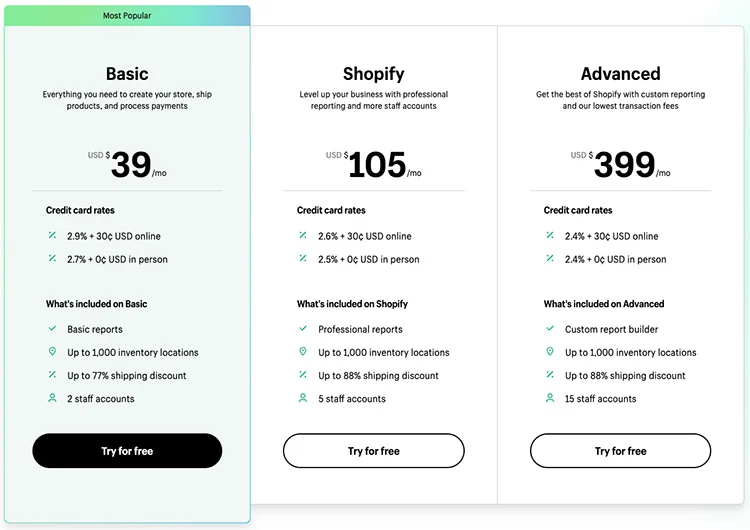
Shopify offers different plans depending on your business needs. For instance, their Basic Shopify Plan is perfect for startups and small businesses due to its affordability.
On the other hand, their Advanced Shopify Plan is perfect for established stores that need more features and functionality.
Whatever your business model or budget, there’s sure to be a Shopify plan that fits your needs. Each plan includes ongoing customer support and access to all of Shopify’s innovative eCommerce tools so you can build a successful online store with ease.
Shopify Dashboard
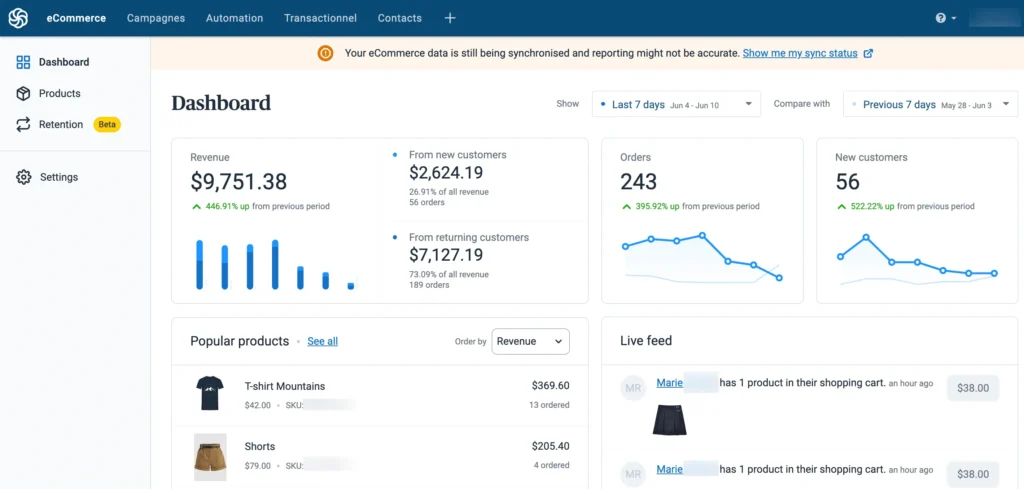
Shopify is a powerful and user-friendly e-commerce platform used by thousands of businesses, from small mom-and-pop shops to large stores.
Its intuitive interface makes it easy for both beginners and experts alike to set up their own Shopify store. And with the Easy Setup Guides, you can get started in no time.
Along with its numerous features, Shopify’s dashboard is one of its most useful tools for managing orders, tracking sales, managing your inventory, and more. Here’s what you need to know about Shopify’s dashboard:
Shopify’s Dashboard: An Overview
Shopify’s dashboard is the main hub for all your online business activities and can be accessed from any device at any time from anywhere.
It displays all the important information you need about your store including order status, payment status, discounts applied, and anything else related to selling on your store.
You can also use the dashboard to find out how much each sale costs you, analyze your visitors’ behavior with reports such as total visits and page views over time as well as get insights into your customers and key stats such as average order value (AOV).
This will help you improve your marketing strategies and make better business decisions.
Using Shopify Dashboard Components
The components of Shopify’s Dashboard are essential tools that help you keep track of everything happening in your store.
These components include
- “Orders,” where you can see all current orders including shipped and pending;
- “Sales“, where you can view total revenue,
- AOV (average order value), payments fees, etc.;
- “Inventories” which provides information about stock levels;
- “Analytics” for a better understanding of customer behavior;
- “Discounts & Coupons” allows you to create promotional codes easily:
- “Settings” which covers basic settings such as payment gateway preferences, shipping options, etc.
Using the dashboard is fairly simple but becoming an expert in newly introduced features requires learning some basics first.
A good example would be setting up analytics tracking for improved insights into customers’ shopping habits or creating promotional campaigns for discounts or coupons to boost sales – these are not required if you just have a static website but having an understanding of how they work would greatly increase one’s success rate while operating an eCommerce store on Shopify platform.
Additionally, it is important that stores should frequently keep a check on their sales rate trends over time using the analytics section to determine which promotions worked against other promotions if applied across multiple platforms like Facebook or Instagram ads thus allowing them to understand customer preferences better way than before
Shopify Security
Shopify includes various security features that are designed to keep your store safe and secure. This includes encryption for sensitive data, two-factor authentication for store administrators, and verification check procedures.
Shopify also implements multiple layers of fraud protection measures and requires all merchants to adhere to Payment Card Industry Data Security Standards (PCI DSS), which ensures the security of customers’ credit card information when making purchases from your store.
WordPress Overview
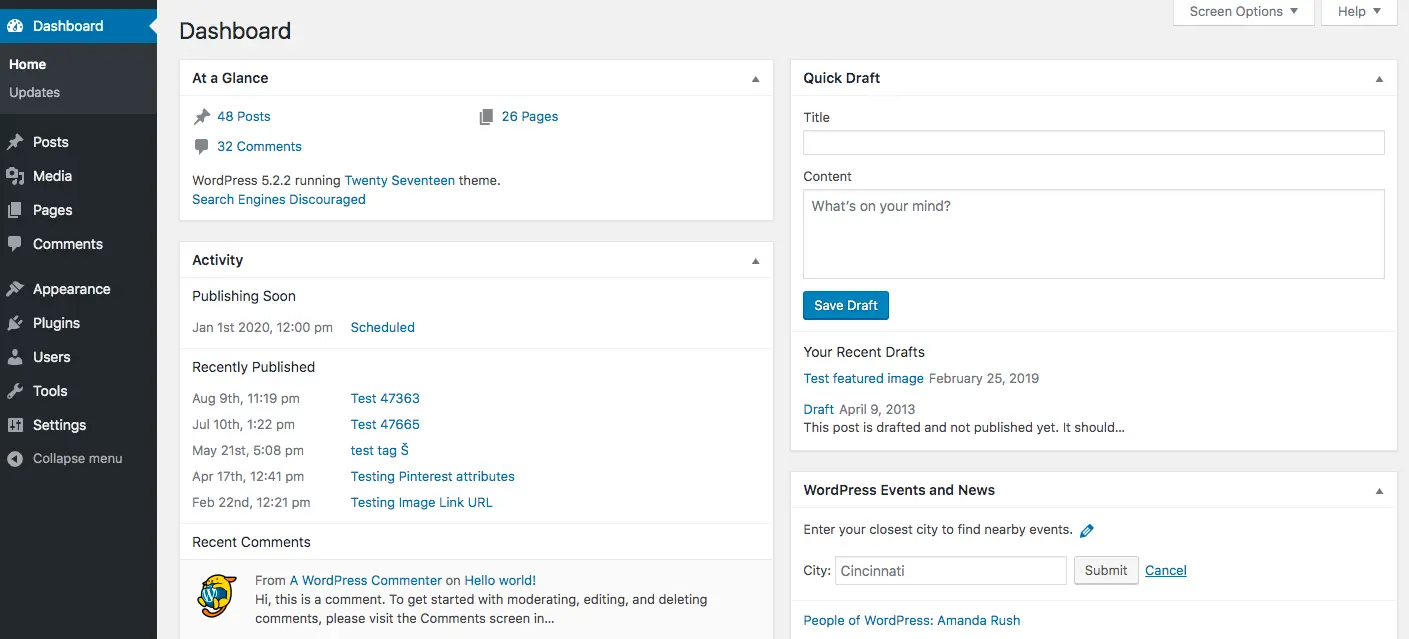
WordPress, on the other hand, is an open-source CMS (Content Management System) that was initially designed to create blog posts.
It is an outstanding CMS platform based on PHP and MySQL. WordPress, which was founded in 2003, now hosts over 30,400,000 live websites, including some well-known brands such as The New York Times, Bloomberg, and Spotify.
You can now create any type of site with WordPress, from a real estate marketplace to an online magazine, thanks to changes to the core code and WordPress’s massive ecosystem of plugins and themes.
WordPress is divided into two versions: WordPress.com (hosted) and WordPress.org (self-hosted) (more on that later).
WordPress Pricing Plans
WordPress is a free and open-source platform, meaning you can use it without having to pay any fees. However, if you want to develop a more advanced website, you will need to invest in web hosting and other services.
There are many different pricing plans for WordPress hosting, ranging from basic shared hosting to more expensive managed plans. The most popular type of WordPress hosting plan is the shared Hosting plan.
Make an E-commerce website in WordPress
WordPress is an ideal platform for creating an e-commerce website. Using WordPress, you can easily create a fully functional webshop for selling products.
WordPress offers many themes and plugins that allow you to quickly build an attractive and responsive website.
Additionally, there are several third-party services available to integrate with your site, allowing you to accept payments from customers and manage the entire operation from within the WordPress dashboard.
With its user-friendly features and robust capabilities, WordPress has become one of the most popular options for creating a successful e-commerce website.
You May Also Like
Guide of How to SetUp a WordPress Blog and Make Money
WordPress Security and Updates
WordPress Security and Updates are critical for keeping your website secure. WordPress software is regularly updated to the latest version, which helps protect it from security threats such as malware and hackers.
It’s also essential to periodically check for available WordPress updates and keep your plugins up-to-date. Additionally, installing security applications like WordFence can help ensure that your website is safeguarded from vulnerabilities and malicious activity. These measures will help secure your WordPress website and keep its data safe.
Shopify vs WordPress Payment Options and Additional Fees
Both platforms allow online payment processing, with a range of options to suit different payment gateways. Furthermore, neither has any prohibitive fees. As such, this aspect is equal between the two.
Shopify includes an additional fee if you do not opt for Shopify Payments or use your own merchant account/PayPal when processing payments. This fee can be associated with your Shopify Plan.
Shopify encourages the usage of its in-house Shopify Payments plans. The advantages include convenience and competitive pricing when compared to other payment solutions like PayPal and Stripe.
However, those who choose not to use its services may incur additional fees.
WordPress can help facilitate payments through a selection of payment gateways and plugins, such as Stripe, PayPal, or Razorpay. WooCommerce grants access to over 100 payment gateway choices.
Unlike Shopify, these WordPress e-commerce plugins do not charge additional fees per transaction. You will only incur the transaction fees charged by your online payment processor.
Shopify vs WordPress SEO: An Overview
When it comes to SEO flexibility, each web development platform has its own set of advantages and disadvantages. The specific business requirements you have will also play a role in determining which platform is best for your company.
Shopify Pros and Cons
Pros of Shopify for SEO
There are numerous advantages to using Shopify for SEO, which include:
- Rapid load times
- Mobile optimization is built in.
- SSL certifications
- SEO-ready
- HTML5 and CSS coding optimization
- SEO app support
Loading times are a primary ranking factor that Google considers, owing to the fact that most users abandon websites that take too long to load. Shopify has excellent load times, which are typically faster than WordPress and other self-hosted solutions.
Shopify’s fast load times can be attributed to its lightweight applications. All Shopify eCommerce stores use back-end server technology that scales well with computing resources, ensuring high speeds.
For the monthly fee, Shopify users also get access to SSL certificates. These certificates are intended to provide high-end SSL encryption to eCommerce stores.
Without an SSL certificate, Google and other search engines will penalize your website’s SEO ranking.
Another significant advantage of Shopify is the inclusion of built-in mobile optimization, which Google considers to be a key ranking factor.
Having a mobile-optimized eCommerce store is likely the only way to retain customers who primarily view websites on their mobile devices. Shopify uses a mobile theme architecture by default, so your store will be mobile-optimized right away.
Shopify is also well-known for being SEO-ready out of the box. Shopify’s CMS was created with the goal of eliminating the most technical aspects of search engine optimization.
While there aren’t many SEO features available with Shopify, all of the essentials are included. Shopify, for example, generates XML sitemaps automatically. Titles, descriptions, and meta tags can all be customized to your liking.
Another significant advantage of using Shopify for SEO is that they provide a plethora of SEO apps that you can download to extend the platform’s SEO functionality.
Fully optimized HTML5 and CSS coding is a key SEO feature available with the Shopify platform that WooCommerce does not provide. Shopify has its own CSS editor called Liquid.
Shopify websites typically provide better user experiences and faster load times due to the use of optimized coding.
Cons of Shopify for SEO
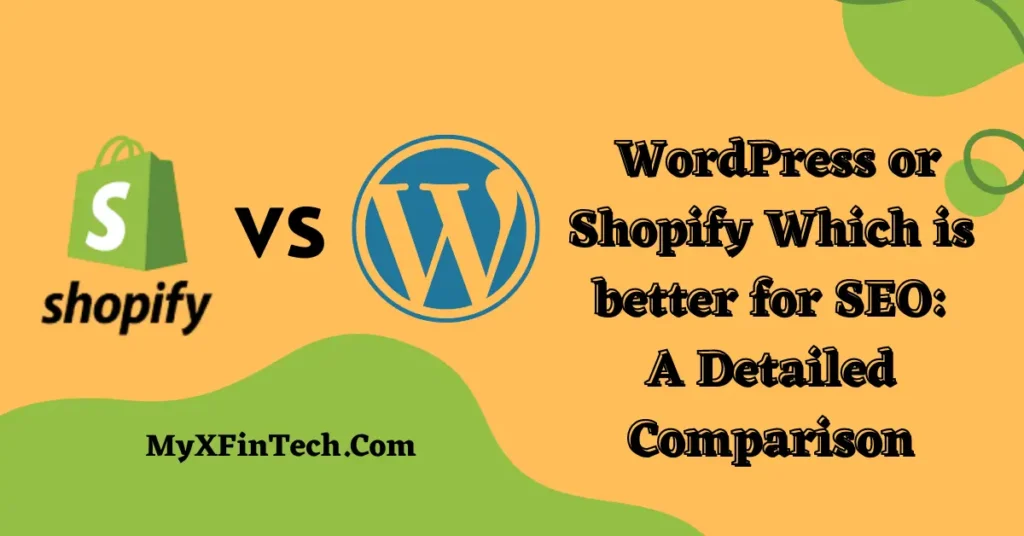
There are also some issues that you are likely to encounter when using Shopify, the most significant of which are:
- There are fewer technical customization options.
- URL customization is relatively limited.
- Blogging functionality is limited.
- Prices higher
Users cannot change the SEO aspects of their website on Shopify. While the platform is user-friendly, this advantage means you won’t be able to perform customizations that improve on Shopify’s existing SEO features.
Shopify has very limited blogging functionality compared to WordPress. When it comes to SEO ratings, search engines like Google and Bing will prioritize engaging content.
Although Shopify websites can have a blog post, this functionality is very basic and lacks many blogging features.
When compared to WordPress, Shopify’s URL structure customization is severely limited. Remember that optimized URLs are considered necessary for a modern website. Google penalizes long and disorganized URL structures.
Another disadvantage of Shopify is that it is more expensive to use than WordPress. When it comes to paying for Shopify, the most basic package is $29 per month. While Shopify is easier to use, the premium you pay may not be worth it.
WordPress Pros and Cons
Pros of WordPress for SEO
WordPress, through the use of WooCommerce, provides many SEO features and services to site owners. These advantages include:
- SEO-friendly code that can be customized
- There are numerous SEO plugins.
- URLs that are optimized for search engines
- Significant blogging support
WordPress was created with search engine optimization in mind. In fact, the SEO plugins available with WordPress give you access to every aspect of your website’s design, allowing you to customize it as you see fit.
The URLs provided by WordPress can also be customized. You can change the structure of the permalink URL to ensure that it meets Google’s SEO requirements.
One of the most advantageous aspects of using WordPress is the availability of numerous SEO plugins. For example, the Yoast SEO plugin and RankMath are powerful SEO optimization tools that can be easily integrated into the design of your website.
You can easily customize names, images, metadata, servers, and image compression with this tool.
When you use WordPress, you’ll get excellent blogging support. WordPress started out as a blogging platform. Over time, the blogging features have improved even more from their strong foundation, which Shopify does not have.
Cons of WordPress for SEO
Despite the fact that WordPress has many SEO features, there are a few issues to be aware of, which include:
- Manual SEO configurations are required.
- Slower rates
- CSS is not optimized for mobile devices.
Shopify wants users to be able to launch their storefronts as soon as possible. While this causes issues due to a lack of customization options, it also means that creating a website isn’t that difficult.
WordPress provides a plethora of fantastic technical customization options. However, manual SEO expertise is required to get the most out of these options.
You’ll also notice that the themes aren’t mobile or CSS-friendly. While the Shopify architecture is SEO-friendly by default, most WordPress themes are not mobile-friendly.
You’ll most likely be tasked with either purchasing an already highly optimized theme or optimizing this theme yourself.
As previously stated, WordPress is significantly slower than Shopify, owing to Shopify’s optimized server architecture and simplified code.
The speed of your WooCommerce storefront is determined by the state of your servers, image compression, database optimization, and the use of site plugins.
Things to watch when choosing a CMS platform
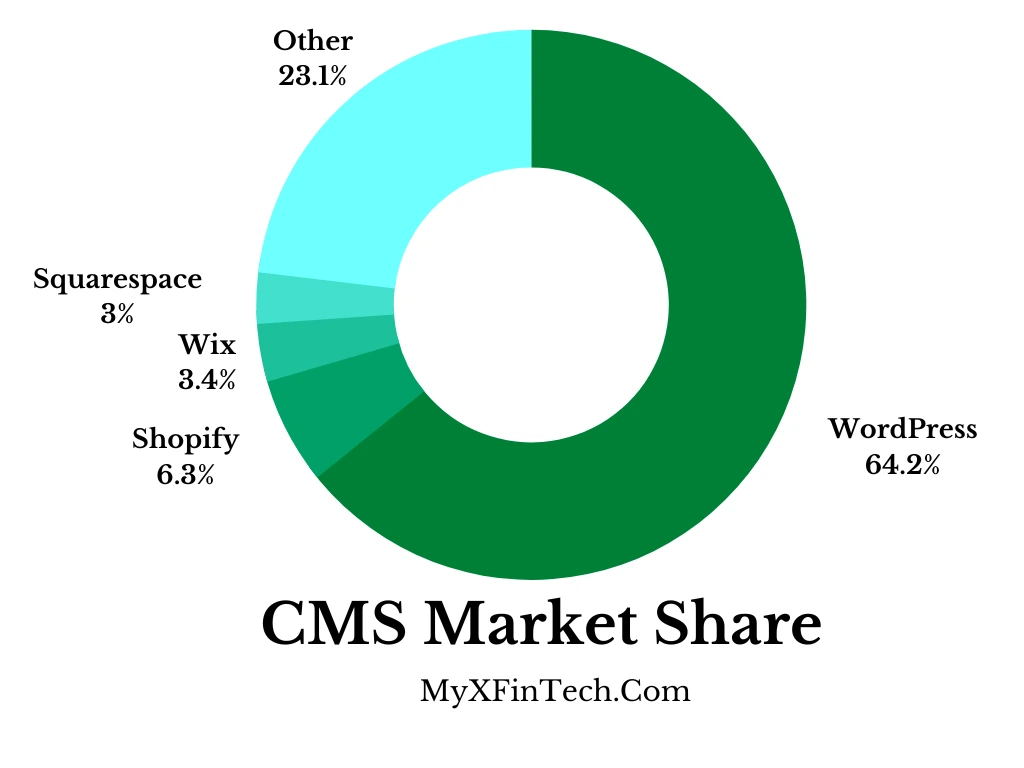
I’ll give you a list of some basic and essential features to look for in any eCommerce solution when selecting an SEO-friendly platform:
When it comes to selecting an eCommerce platform, it is important to pick one that is optimized for search engine optimization (SEO).
An SEO-friendly platform will help your store rank higher in search engine results pages so that more potential customers can find it.
There are several key things to watch out for when choosing an SEO-friendly platform, such as its ability to produce a clean code structure and fast loading times, its compatibility with third-party tools and integrations, and the availability of useful built-in features.
A good starting point is evaluating the code structure of the platform — look for clean and valid HTML markup rather than convoluted structures.
This is because different search engine algorithms evaluate page elements differently if they’re nested inside other elements.
Moreover, ensure that your chosen platform produces loading speeds that are free from any abnormal problems or delays. Your site speed should be consistent across all devices and platforms.
Additionally, check if your platform integrates well with other third-party tools such as analytics or marketing automation solutions.
Finally, features such as structured data or Open Graph tags further enable you to optimize how content is displayed in search engine result pages which can positively impact rankings.
Consider these essential criteria carefully when deciding on SEO.
Can I Move My Website From Shopify To WordPress?
If you have a Shopify website and are interested in moving to WordPress, it is possible. To make the transition, you will need to perform a migration process with the help of a third-party app.
There are many options available, such as one that can migrate your entire store from Shopify to WooCommerce.
To get started, simply open the WordPress dashboard and click on Plugins. Once there, type Import from Shopify into the search box on the left and review all of the vetted plugins presented.
Take time to compare and consider each option before making a selection to ensure it best meets your needs for a successful switch.
With the right plugin chosen and installed, your website will be set up with minimal hassle on a new WordPress platform in no time at all.
Can I Move My Website From WordPress To Shopify?
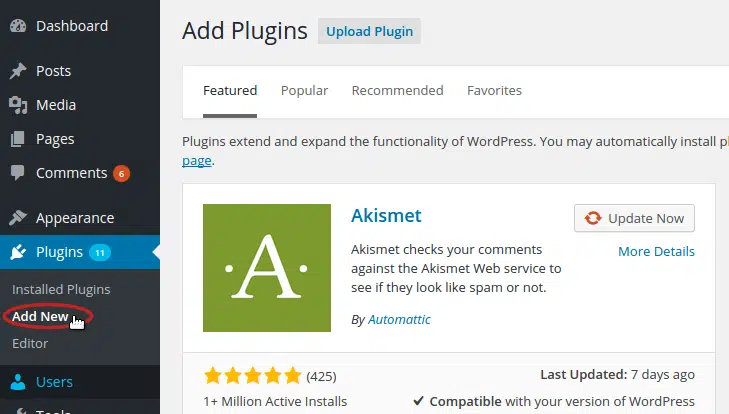
Moving your website from WordPress to Shopify can be a great decision for those who want greater control over their site design and functionality.
Fortunately, the process of transferring content from one platform to the other doesn’t have to be complicated.
With the help of third-party applications, you can quickly transfer your existing content, including posts, pages, and images, from WordPress to Shopify in only a few simple steps.
A great way to find the right plugin needed for this process is by searching through the WordPress dashboard.
Once you click on Plugins, use the search box on the left to look up “Export to Shopify” – this will bring up a list of plugins that can provide assistance with moving your website data over.
After reading reviews and comparing each feature, select the best migration tool that works for your needs and begin transferring content from WordPress to Shopify.
Shopify vs WordPress: Dropshipping Options
When it comes to dropshipping, both WordPress and Shopify have plenty of options available. With WordPress, usually, the easiest option is to use a plugin or a compatible third-party service, such as WooCommerce Dropshipping.
This gives users the ability to create a dropshipping store without having to build additional features.
Shopify also offers an abundance of plugins and third-party services for those wanting to pursue dropshipping with their e-commerce store.
Many of these add-ons allow you to sync with popular suppliers to quickly set up a product catalog while someone else takes care of the shipping process.
With fewer operational tasks and costs, dropshipping is becoming more and more popular among smaller businesses thanks to this type of solution.
In short, when comparing Shopify vs WordPress on the issue of dropshipping options, Both two are great choices that can suit any individual’s needs in terms of how much control they would like over their store operations.
Shopify vs WordPress: What Should You Choose?
Whether you’re starting a new business or expanding an existing website, choosing between Shopify and WordPress is critical to your success.
Shopify is an e-commerce platform designed to make creating and managing an online store easier and more accessible, while WordPress provides a comprehensive content management system (CMS).
Both have unique advantages and drawbacks that must be evaluated when making this important decision.
Shopify is better suited for those looking for an all-encompassing e-commerce shopping experience.
In addition to providing access to a free SSL certificate, Shopify offers plenty of coding options, payment options such as PayPal, Apple Pay, and Google Wallet as well as a host of other add-ons that facilitate the online buying process.
On the other hand, WordPress provides more flexibility in terms of design and code manipulation. A WordPress website is highly customizable allowing users to build sites that are tailored precisely to their specifications or industry needs.
The highly activated WordPress community with its extensive plugin library provides extensive support throughout the development stages as well as post-completion support when issues arise.
Additionally, access to many third-party integrations makes it easier for business owners who don’t have the resources or skillset necessary to build out an e-commerce presence.
Shopify vs WordPress – Conclusion
When considering the options between Shopify and WordPress, one might have many questions.
For larger eCommerce businesses, hosted platforms like Shopify or WordPress.org with appropriate plugins are more suitable than WordPress.com.
However, if the purpose of your website is more personal in nature, such as testing, blogging, or hobbies, WordPress.com is still a viable option.
Both WordPress and Shopify offer easy setups with no maintenance required, allowing users to start for free. It is important to consider the differences between the two website builders in order to determine which is best suited for your needs.
If you have a personal project you want to launch, such as testing, sharing your thoughts or a hobby site, WordPress.com is an option to consider.
It offers easy setup and the cost of getting going is free; you do not need to manage any upkeep either.
Hopefully, you’ve already identified some key differences that will determine whether WordPress or Shopify is the right website builder for you.
Visit Shopify Now To Start Your Own Shop: Visit: Shopify
Shopify vs WordPress: FAQs
– What are the advantages of using Shopify over WordPress?
Shopify has numerous advantages compared to WordPress, including a comprehensive suite of e-commerce features designed to streamline the online buying process.
Shopify also offers a wide range of payment options and add-ons, as well as easy coding options for those who wish to customize their store further.
Additionally, Shopify provides access to a free SSL certificate, ensuring secure transactions on an online store.
– What features does Shopify offer that WordPress doesn’t?
The one thing that Shopify offers and WordPress doesn’t is the feature to Buy a Custom Domain Name.
Shopify offers a wide range of features specifically designed for e-commerce, such as integrated payment gateways and a host of other add-ons that make managing an online store easier.
Additionally, Shopify provides access to a comprehensive suite of tools that can be used to create custom designs and layouts, as well as manage inventory, track sales, and more. Lastly, Shopify also provides
– How difficult is it to set up a website with Shopify compared to WordPress?
When comparing Shopify and WordPress, it is evident that Shopify offers more convenient usage than WordPress. However, there are other factors to consider when making a decision between the two platforms.
– Is customizing content easier with WordPress or Shopify?
When it comes to customizing content, WordPress offers more flexibility compared to Shopify. WordPress allows you to customize your content with SEO-friendly keywords and optimize your website with plugins and custom coding.
This makes it easier for your website and its content to be indexed by search engines like Google. Additionally, WordPress has a large online community that provides support throughout the development stages, as well as post-com
– Does Shopify offer better customer service than WordPress?
Shopify offers a comprehensive customer service package that includes 24/7 support via phone, email, and live chat.
This ensures customers can get the help they need quickly, even if they are not tech-savvy.
Additionally, Shopify offers extensive online documentation and tutorials to help customers with any issues they might have. This makes it easier for business owners to troubleshoot problems and find solutions
